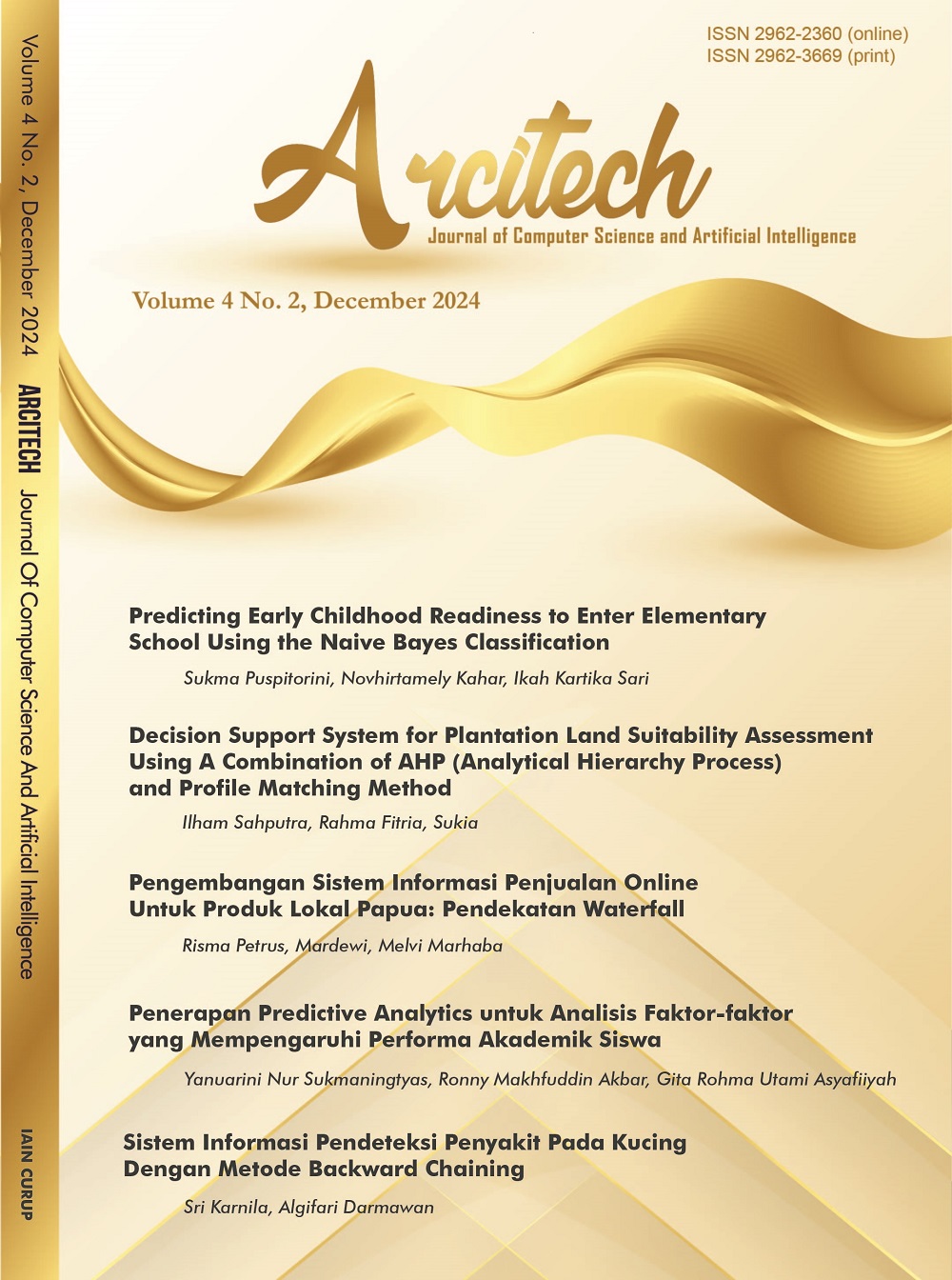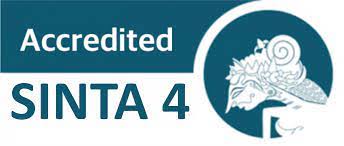Predicting Early Childhood Readiness to Enter Elementary School Using the Naive Bayes Classification
DOI:
https://doi.org/10.29240/arcitech.v4i2.11635Keywords:
Naïve Bayes, Data Mining, RapidMiner, Web Application, Predictive ModelAbstract
This study aims to examine the readiness and maturity of early childhood in entering elementary school using the Naïve Bayes method. This analysis involves variables such as gender, age, aspects of physical-motor, cognitive, social-emotional development, and literacy skills which include reading, writing, arithmetic, and children's level of independence. The readiness category is classified into two classes, namely "ready" and "not ready". This prediction model is designed to provide a comprehensive understanding of the factors that affect the classification results, so that the evaluation process can be carried out in a transparent, objective, and data-driven manner. This research is expected to be a reference for other educational institutions in implementing a similar model to evaluate student readiness systematically. By adjusting variables and data according to local needs, this model has the potential to support more accurate and standardized decision-making, as well as improve the quality of early childhood preparation in entering formal education. The results show that the Naïve Bayes method is able to achieve an accuracy level of 93.33%, confirming its effectiveness in identifying early childhood readiness optimally.
Downloads
References
Astuti, R. W., Puspitorini, S., & Kurnia Akbar, F. (n.d.). Implementation of the naïve bayes theorem in the analysis and prediction of the field of work of alumni of the stmik informatics engineering study program, nurdin hamzah jambi.
Aziz, S. Al, & Septriyanti, Y. (2023). Correlation between Indonesian Literacy and Mathematical Numeracy Literacy of Students in Solving Mathematics Problems. Lattice Journal : Journal of Mathematics Education and Applied, 3(1), 14. https://doi.org/10.30983/lattice.v3i1.6324
Damanik, A. R., Hartama, D., Damanik, I. S., Information, S., & Tunas Bangsa, S. (n.d.). SYSTEMASI: Journal of Prediction Information System of Mortality Rate in Indonesia due to Covid-19 Using the Naïve Bayes Algorithm. http://sistemasi.ftik.unisi.ac.id
Firmansyah, F., & Yulianto, A. (2023). Prediction of Learning Outcomes Using Naïve Bayes Classifier at the Elementary School Level. Remik, 7(2), 1174–1182. https://doi.org/10.33395/remik.v7i2.12375
Hidayat, Y., & Nurlatifah, L. (2023). Comparative analysis of the level of early childhood development achievement (stppa) based on permendikbud no. 137 of 2014 with permendikbudristek no. 5 of 2022. Journal of Intisabi, 1(1), 29–40. https://doi.org/10.61580/itsb.v1i1.4
Kamphorst, E., Cantell, M., Van Der Veer, G., Minnaert, A., & Houwen, S. (2021). Emerging School Readiness Profiles: Motor Skills Matter for Cognitive- and Non-cognitive First Grade School Outcomes. Frontiers in Psychology, 12. https://doi.org/10.3389/fpsyg.2021.759480
Kurniawati, N., Hayati, T., Islam, P., Age, A., Uin, D., Gunung, S., Bandung, D., Cimencrang, J., Bage, G., Bandung, K., & Barat, J. (n.d.). Increasing children's independence through practical life skill activities.
Munisa, Nofianti, R., & Andini, N. R. (n.d.). The readiness of children aged 5-6 years to enter elementary school.
Pavic, J. (n.d.). 202307_PavicJakov_WEKA.
Permana, I., & Salisah, F. N. S. (2022). Pengaruh Normalisasi Data Terhadap Performa Hasil Klasifikasi Algoritma Backpropagation. Indonesian Journal of Informatic Research and Software Engineering (IJIRSE), 2(1), 67–72. https://doi.org/10.57152/ijirse.v2i1.311
Preet, K., Attwal, S., & Singh Dhiman, A. (2020). Exploring data mining tool-weka and using weka to build and evaluate predictive models. In Advances and Applications in Mathematical Sciences (Vol. 19, Issue 6). http://www.cs.waikato.ac.nz/ml/weka/downloading.html.
Sartika, L., & Wulandari, D. (2023). Early childhood islamic education institutions. Al Athfaal Journal, 1(1), 2–6. https://doi.org/10.62214/jalfal.v1i1.92
Singh, S., Kaur, H., Kanozia, R., & Kaur, G. (2023). Empirical Analysis of Supervised and Unsupervised Machine Learning Algorithms with Aspect-Based Sentiment Analysis. Applied Computer Systems, 28(1), 125–136. https://doi.org/10.2478/acss-2023-0012
Susilarini, T. (n.d.). Early detection of readiness to enter elementary school through the Nijmeegse Schoolbekwaamheiid Test (NST) and Children Personal Matrix Test (CPM) (a quantitative descriptive study on kindergarten children who will enter elementary school).
Syahrizal, S. (2021). A Descriptive Study of Children's Readiness to Enter Elementary School (SD) Through NST Test and IQ Test at Kindergarten Pembina Kisaran Asahan Regency. Social Library Journal, 1(3), 101–106. https://doi.org/10.51849/sl.v1i3.47
Wickramasinghe, I., & Kalutarage, H. (2021). Naive Bayes: applications, variations and vulnerabilities: a review of literature with code snippets for implementation. Soft Computing, 25(3), 2277–2293. https://doi.org/10.1007/s00500-020-05297-6
Downloads
Published
How to Cite
Issue
Section
Citation Check
License
Copyright (c) 2024 Sukma Puspitorini, Novhir, Ikah

This work is licensed under a Creative Commons Attribution-NonCommercial-ShareAlike 4.0 International License.
Authors who publish with Arcitech: Journal of Computer science and Artificial Intelligence agree to the following terms:
- Authors retain copyright and grant the journal right of first publication with the work simultaneously licensed under a Creative Commons Attribution-NonCommercial-ShareAlike 4.0 International License (CC BY-NC-SA 4.0) that allows others to share the work with an acknowledgment of the work's authorship and initial publication in this journal.
- Authors are able to enter into separate, additional contractual arrangements for the non-exclusive distribution of the journal's published version of the work (e.g., post it to an institutional repository or publish it in a book), with an acknowledgment of its initial publication in this journal.
- Authors are permitted and encouraged to post their work online (e.g., in institutional repositories or on their website) prior to and during the submission process, as it can lead to productive exchanges, as well as earlier and greater citation of published work (See The Effect of Open Access).













